Opening of the LXVI Theatre Festival
2nd July 2012 from time 6 30 P.M Palazzo Grifoni, San Miniato
Opening of the LXVI Theatre Festival
Fragments from Mary's existence

2nd July 2012 time 9 30 P.M. Palazzo Grifoni
A show-conference by and with Roberto Mussapi
Fragments from Mary's existence is a monologue in seven parts, seven independent poems inspired by moments in Mary of Nazareth's existence, both taken from the (very few) quotes from the Gospels, and the tradition, but also invented by the author from verified historical data.
It is a monologue in verse where the narrator, an angel, retells various moments in the life of Christ's mother, both as a witness and as an actor, as many angels took part to her vicissitudes.
Mussapi is the author and voice of the angel, director and also chose the music for the play.
This work will open the new San Mniato Festival, and the book of the same name will be published by Raffaelli Editore at the end of June, so that it will be at the public and the readers' disposition the day before performance.
Woe to you rich ones, daddy was a Catholic Communist

3rd July 2012 time 9 30 P.M Auditorium San Martino, Hotel San Miniato
by Sicilia Testro
written and interpreted by Giovanni Scifoni
The public is welcomed into the Auditorium by a chaotic montage of voices and opinions; they are interviews taken outside schools in the suburbs of Rome. Then, suddenly, the prog-rock of a "Beat- Mass" starts and the Narrator starts the show, bringing us back to the 60s, when debate was truly alive and crucial. Young Catholics were talking, Marx's works were read in parishes, there were discussions about "social sin", there were working-class priests and churches were occupied to protest against the war in Vietnam. Then, our Narrator brings us further back, to Colombia, with guerrilla priests and a theology of freedom, Victor Jara's chants of protest and fascist writings on the wall stating "Be patriotic, kill a priest". Then, he takes us even further back, in the presence of Saint Augustin, Saint John Chrysostomom and their homilies against greed. The Narrator intertwines his stories with irony and a taste for paradox. Every story generates questions and torments our conscience: there are those who have found practical solutions, while others are still looking. The Narrator brings on stage what he discovered during his research.
Laudario di Santa Maria della Notte
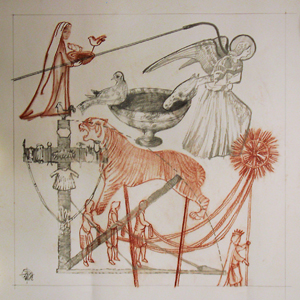
5th July 2012 time 9 30 P.M Church of San Francesco
by Fondazione Istituto Dramma Popolare, Compagnia di Santa Maria della notte
with Marco Azzurrini, Agostino Cerrai, Roberta Geri, Andrea Giuntini
music for polyphonic choir Roberto Tofi, dramaturgy and direction by Salvatore Ciulla
World premiere
The Laudario di Santa Maria della Notte of Sansepolcro is a luminous example of that splendid popular and religious literature which flourished in our country during the Middle-Ages, especially in Tuscany and Umbria, and conjugated people's faith with their artistic feeling in a unique way. A holy representation inspired by the Middle-Ages whilst using contemporary languages, the show is a montage of a number of "laudi" from Sansepolcro about the earthly experience of Jesus seen through the eyes of Mary, to whom this work is dedicated. Its verses, born from popular devotion, were used as a prayer to the Madonna by the peasants who were part of the Brotherhood of Santa Maria della Notte. Just before dawn, leaving town to go to the fields, these devoted workers used to consecrate the day to the Madonna, asking for her blessing and remembering the angelic annunciation, a source of Grace and Salvation. A dramaturgical work was made to put together different lyrics including singing parts and acting parts.

A group of actors and choristers will bring the various characters to life. The different "laudi", completely adherent to the ancient text, are assembled in a different order to the traditional archive one, creating a sort of popular storytelling, seen thorough the eyes of the Madonna, of the history of Salvation..
Death of Adam

9th July 2012 time 9 30 P.M Dome
by Fondazione Istituto Dramma Popolare, Anima Mundi and Corale Cosimo Balducci
by Elena Bono
with Gabriele Carli, Agostino Cerrai
Director Salvatore Ciulla
The oratorial Death of Adam is built through the words of the great author and playwright Elena Bono.
"In my work, I have always told the story of the Passion of the Christ which renovates itself throughout history" the author often declared, and this work, her very first story, is a clear example and demonstration of it. Adam, here representing the whole of our sinful humanity waiting for Salvation, remembers the Garden of Eden with yearning nostalgia at the end of his long earthly life. He recalls his difficult relationship towards God, his will to be like him, and the original sin; also, the terrible memory of Abel's blood, killed by his other son Cain. Also, he recalls God's promise of Salvation through the sacrifice of his Son, the new Abel, the Lamb. In the show, Death of Adam will be performed by three actors in alternation with a series of psalms sung by a choir, taken from the Mercifulness of God, with music from different ages. A cello, a flute and an organ work in dialogue with the actors' voices, becoming like a sound "backdrop" or an actor themselves, thus knitting a poetic and musical score of great evocative power.

13th July 2012 time 9 30 P.M Auditorium San Martino, Hotel San Miniato
by Fondazione Paolo VI per il Sacro Monte di Varese
by Angela Demattè,
with Alberto Mancioppi,
directed by Andrea Chiodi
A new creation and a great performer to face a difficult challenge, that of bringing back to life and on stage the "traitor", Judas. What is the face of evil like? A blaspheme and shocking Ecce Homo. That is all. Here is the man feeding himself to the people to assert his truth. To see if there ever was a truth. He needs us but maybe we, too, down in the audience, need him. To know the truth. Do we really want it? Ecce Homo. Now we need to know what to do about him, once again. A performance where the simplicity of the decor and the power of the interpretation try to be at the service of great questions.
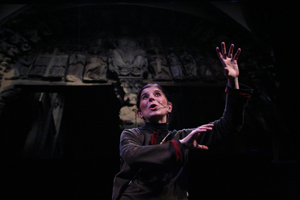
16th July 2012 time 9.30 P.M Auditorium San Martino, Hotel San Miniato
by Fondazione Istituto Dramma Popolare and Jobel teatro
with Marinella Montanari
byi Lorenzo Cognatti

Insipred by ancient attestations (the manuscripts by medieval pilgrims, the chronicles and novels of the 12th-13th century), Cognatti's work retraces a hypothetical pilgrimage from Rome to Santiago de Compostela with knights, jesters, angels, devils, magicians, monks, saints and bandits. A merry female jester is the narrator of the story, herself following the long path, reliving its stops through the Via Francigena, the Via Podense and the Camino de Santiago, discovering the charm of an ancient Europe in movement through Italy, France and Spain. An enjoyable theatrical pilgrimage alternating historical tableaus, traditions, funny episodes, evocative stories, chants and grammelot, in a growing emotion to the desired destination.
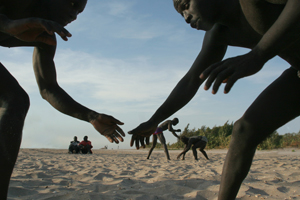
17th July 2012 time 9 30 P.M Church of San Francesco
by Teatro Metastasio Stabile della Toscana in collaborazione con Fondazione Istituto Dramma Popolare
by Leopold Sedar Senghor
Score for acting, singing, piano, trumpet, drums, kora
with Luca Lazzareschi (acting voice), Papi Thiam (drums, singing), Maly Dialy Cissoko (kora, singing), Mirlo Cosottini (piano, trumpet)
A project by Massimo Luconi
Senghor elaborates the character of Chaka, king of the Zulu, as a symbol of freedom from slavery and a pioneer of the fight for African freedom; he widens its figure in an evangelical sense, halfway through a Christian martyr and Orpheus descending into the hell of blackness, building a short but extremely intense parable with a fine linguistic structure. Senghor's lyricism and the originality of the dramaturgy, mixing the force of tragedy with the simplicity of popular storytelling, put this work outside genre schematizations, in an epical context of touching spirituality.
The abandonment to divine will
The spiritual diary of Giuseppe Toniolo

18th July 2012 time 6 30 P.M Palazzo Grifoni, San Miniato
Show-Conference with Agostino Cerrai, Andrea Massei Linda Palatella, Federica Sgro, Paola Lombardi
music played by Grazia Barsotti and Laura Battini
set and video by Bernardo Pellegrini
curator Agostino Cerrai
The text is inspired by the pages of the diary of Giuseppe Toniolo, pages from which his deep and intense spirituality emerge neatly, as a root and measure of his untiring cultural, socio-political and ecclesial engagement.
In these personal writings, as in his letter to his son or his girlfriend that counterpart pages of his diary, his ideals, values and virtues come to life, as the source of his fecund presence in his time.
.
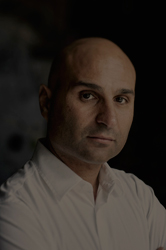
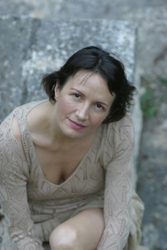
from the 19th to the 23rd July 2012 time 9 30 P.M Piazza Duomo, San Miniato
by Fondazione Istituto Dramma Popolare, Tieffe Teatro, Proxima Res, Fondazione Paolo VI per il Sacro Monte - Tra Sacro e Sacromonte
by Roberto Cavosi
directed by Carmelo Rifici, with Maddalena Crippa, Francesco Colella, Carlotta Viscovo, Raffaella Tagliabue, Stefania Medri, Francesca Mària
World Premiere
Summer, 1976. In Seveso, a breakdown to the chimney of a perfume factory causes a great leakage of a dioxin cloud. Dioxin is an extremely toxic substance: it causes scalds, cancer and it is teratogenetic. It was used in Vietnam for napalm bombs. Sara is a woman from Seveso; she is happily married and is expecting a child. That cloud changes her life. Because of her pregnancy, she doesn't know what to do.
In 1976, nobody knew the exact consequences of dioxin on the foots, nor there were medical analysis to understand the real physical conditions of the child. Only a few, imprecise information came from Vietnam, together with alarming news of extremely serious genetic malformations.
In Seveso, thousands of kettle were dying. Adults and children were hospitalized with forms of chlorachne. 
 The town was evacuated. Sara, unable to receive answers from science, turns her attention to the Holy Virgin, asking for her help. Her plead gets more and more insistent. Sara's wishes for a miracle: she would like Mary to come down from the sky and help her. Her adamance is such that Mary not only accepts her plead; she proposes an exchange, " If your burden is too heavy, you'll take mine and I'll take yours".
Sara, thinking she would be sitting amongst the angels, accepts the exchange. But her happiness is short-lived: she finds herself on the Golgotha by her crucified son. Again, she is standing by a son she cannot defend.
The town was evacuated. Sara, unable to receive answers from science, turns her attention to the Holy Virgin, asking for her help. Her plead gets more and more insistent. Sara's wishes for a miracle: she would like Mary to come down from the sky and help her. Her adamance is such that Mary not only accepts her plead; she proposes an exchange, " If your burden is too heavy, you'll take mine and I'll take yours".
Sara, thinking she would be sitting amongst the angels, accepts the exchange. But her happiness is short-lived: she finds herself on the Golgotha by her crucified son. Again, she is standing by a son she cannot defend.
The search for a transcendent sphere, of an emblematic and spiritual world, of an existential "meaning", together with a strong civil engagement, are the characteristics of Erring soul. The play is a contamination of different languages: dance, prose, music, singing, dialogue and monologue. It looks for a synthesis through precise differences in style; liturgical, medieval theatre for the first ending; realism for the scenes set in the Motel of Assago or the scene between Sara and the gynecologist; expressionism, for the scenes int he church; all of this, together with strong shades of symbolism and metaphysics. Erring Souls searches for an "absolute mother", a mother in time and through time. It is the difficult path of all women, of all mothers unable to defend their children in a violent world. heir Erring Soul is destined to suffer powerlessly, like Mary who could do nothing for her son on the Cross.
The last tableau is in fact an absolute tableau of mothers of any day and age on their Golgotha, where we can see "images" of mothers of our time: The mothers of the desaparecidos, the mothers of those condemned on the killing field, the mothers of those who died at work, the mothers�

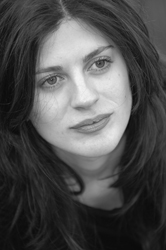
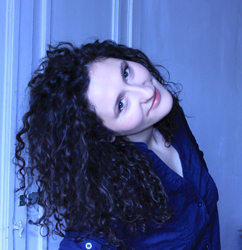







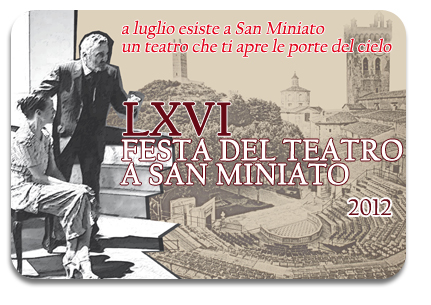
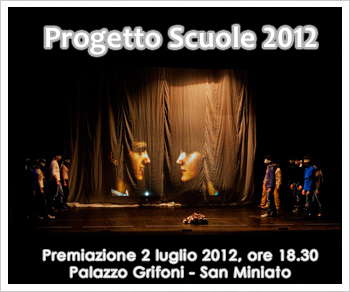 Festival Preview
Festival Preview